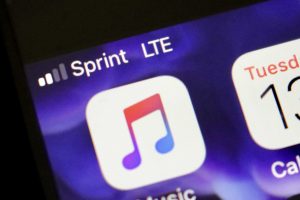By Emily Thompson

When I first heard about Sprint releasing a 5G network, my first thoughts included:
1.) My 4G doesn’t even work properly.
2.) Does increasing the number make it better?
3.) What the heck is 5G?
I am not the most technological person, so the idea of a 5G network sounds like gibberish. I do not expect much from my phone network, although I think we all know the frustration when our cellular data fails us. It’s a sinking feeling. Every time I am on the subway and I watch my signal bars go down, I actually get nervous. It feels like I am Tom Hanks in Castaway. So if this is my life under 4G, what exactly is 5G and will it solve my subway-isolation?
5G stands for fifth generation, meaning that it is the fifth wave of wireless technology. National Geographic breaks down the generations quite simply: “In the early 1990s, when wireless phone technology emerged, the first-generation network (1G) carried voice only. When text between two cellular devices became possible, 2G was born. With 3G came the ability to make calls, send text and surf the web from a wireless device deemed ‘smart.’
Even smarter, and more entertaining, the 4G network allowed us to make calls, send texts, browse the internet and both download and upload video files with relative ease.” If it already feels like we are holding the world in our hands under 4G, what could conceptually be achieved under 5G is astounding. What’s next, teleportation?
Sprint believes that its unveiling of the 5G network will solve much more than just my subway blues. It has described its 5G network as being useful for much more than just cellphones. In fact, they advertise it as being great for just about everything. The Wall Street Journal states that “…5G networks have implications for other machines and devices, such as self-driving cars. Sprint said the 5G network will benefit its parent company SoftBank Group Corp…which—in addition to owning Sprint—also has a major investment in Uber Technologies Inc.” Imagine: one day when you Uber in or out of the city, you may be experiencing the futuristic power of 5G! Our world is morphing into something out of Meet the Robinsons.
So what does this mean for Sprint users and the company’s status? Sprint has stated that its 5G will allow for longer-distance calling. The Wall Street Journal adds, “Sprint said its 5G network would be superior because it relies on airwaves at the 2.5 GHz frequency, which covers greater distances than some rivals.”
It focuses on mobile devices, which could potentially put it ahead of its competitors. Other companies such as AT&T and Verizon are also looking to improve their networks and introduce 5G.
The difference is that Sprint is focusing on a purely mobile network, while many of its competitors are looking to also fix their system. Analyst Will Townsend of Forbes warns that this move is what will put Sprint ahead, since trying to make a mobile and fixed 5G network might be too much for other companies to handle successfully.
I believe that there is always room for improvement in the realm of technology. Right when you think you are living the plot of a futuristic sci-fi film, more improvements are made before you get used to the old ones. Being able to Google on-the-go and access the Internet almost everywhere makes it obvious that so much of our lives revolve around our internet access-especially at college, where communication about classes, friends and family members are a major priority.
While I believe that 5G permits better communication by allowing more reliable long-distance service, it puts me on edge to think about just how much we rely on internet service. If the day came that everything crashed, and everything, including Uber were useless, it is scary if all aspects of our lives rely on wireless networks working properly. Needless to say, we spend our days with our heads stuck in our phones. If this is our reality, it is comforting to know that the companies we rely on so heavily are always looking to the future.
Emily Thompson, FCRH ’21, is an art history major from Norwalk, Connecticut.






































































































































































































